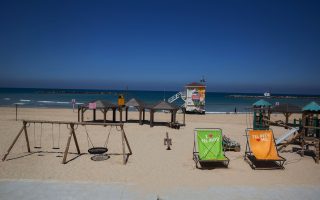GINO: Green in name only?

Greece is going green. The goal of sustainable development has been generally accepted – in principle, at least – and green growth has now been adopted as a pillar of both government policy and the National Recovery and Resilience Plan submitted to the European Union, with the blessing of the opposition. It was also emphasized in the recent Pissarides Committee Report. All this can only be good for our country. But what is the reality at the ground level?
The overarching “green” theme encompasses a range of areas. It includes using fewer hydrocarbons and switching to renewable energy sources, improving infrastructure and transport, making existing buildings more energy efficient, improving waste management and the extent of recycling, and engaging in research and innovation in the field of sustainability. A central aspect of green growth is to protect the environment. This is particularly important in the case of Greece because the environment is under pressure, but also because tourism is vital to our economy – and the government would like to entice digital nomads, retirees and others from overseas to settle here.
Right now, we are concerned that when it comes to the environment, Greece cannot see the forest for the trees. While there is some “box ticking” in terms of particular goals, such as renewable energy sources (especially through wind turbines), we are sorely in need of a coordinated environmental protection policy. The government has three main levers that it can use to effect change in this area. First, through regulation, it can determine what is allowed and what is forbidden. Second, it can grant subsidies and disburse national or European funds to support green initiatives. Third, it can take its own targeted actions to facilitate green growth. Let us examine the problems and priorities in these three areas in turn.
First, regulation. The sad truth is that Greece does not protect its environment effectively. Land uses have been determined for only a small fraction of the country and we still await the definition of forest maps. As a result, residential and business development is unregulated and sometimes chaotic, and it often encroaches on environmentally sensitive areas. A recent effort to strictly regulate off-plan construction has unfortunately been drastically watered down and Greece was found in violation of its obligations to protect the environment by the European Commission. On the upside, however, the completion of spatial planning is one of the proposed actions in the National Recovery and Resilience Plan.
What needs to be done? If spatial planning is to be a success, local governments must have a bigger role. Other European countries already allow municipalities to determine land use, while the central administration sets rules to ensure that proposed plans are both mutually compatible and aligned with broader national strategies. To make the same approach work in Greece, we will need to provide our municipalities with both tangible resources and know-how, as part of a general turn towards administrative decentralization.
Another important area of improvement is to make spatial and environmental data better accessible. This will facilitate investment in real estate by making the process of granting permits more predictable and by minimizing judicial disputes. Furthermore, it is crucial to strengthen the Environmental Inspectorate (EI), which monitors compliance with environmental legislation. To better align with most other European countries, the EI should not fall within the Ministry of the Environment. Instead, it should be an independent authority, commanding far deeper resources and taking active responsibility for imposing sanctions.
The second area of concern is subsidies, especially in tourism development and energy. Given the extent of the forthcoming EU funding, this issue will only become more urgent in the years to come. We believe that public-sector finance is a tool that should be used with great caution. The state should only subsidize a firm when its investment plans will have significant positive externalities for the economy as a whole, which the firm cannot capture. Conversely, public money should not go to businesses that have negative externalities, such as a negative environmental footprint.
For example, in the tourism sector, it might be appropriate to subsidize the rehabilitation and revitalization of traditional settlements – but not the construction of brand new “tourist villages.” Subsidies for renewable energy should be viewed in the same light. After all, both geothermal energy and offshore wind parks have lower environmental costs than locating wind turbines throughout the country.
Finally, we come to the third area: coordinated action by the government to achieve green goals. We believe this should be a key priority, with the aim of developing sustainable and high-value added tourism over the long term. Yet, Greece currently has no coherent tourism strategy over any timescale, long-term or otherwise. This point was made in the recent article in Ekathimerini (15/10) by M.G. Jacobides with L. Carras, president of the Hellenic Society of Environment and Culture, and in the letter to the prime minister signed by 60 leading figures.
Such a strategy is even more vital given the government’s interest in attracting digital nomads and affluent retirees. Such emigrants will have no desire to settle in a country that has lost its unique character and whose beautiful beaches are covered in sun beds. That is why Greece has so much to gain from preserving its environmental and cultural wealth, and why efforts to preserve the character of destinations changing with breathtaking speed like Ios should be taken seriously. We are heartened by the recent announcements from the minister of Tourism on plans for destination management organizations, and of a more sustainable approach to tourism, and we hope they will be linked in with the other pillars of sustainability.
2021 will be a pivotal year for Greece. Our country needs investment, but it still should not accept any and all investment indiscriminately. We must safeguard both our comparative advantage and our environment at all costs. We will have to nurture innovative projects and judiciously deploy state support. And in every area, from sustainable tourism to alternative energy, we must avoid the real danger of being “green in name only.”
Michael G. Jacobides holds the Sir Donald Gordon Chair of Innovation and Entrepreneurship at London Business School, where he is professor of strategy. Dimitri Vayanos is professor of finance at the London School of Economics and a member of the Pissarides Committee.





